Discover how AI marketing automation for e-commerce shaves off hours monthly while boosting ROI. Complete 2025 implementation guide with real success stories.
Managing e-commerce ad campaigns manually is becoming unsustainable. As soon as one product takes off, you’re scrambling to adjust budgets, retarget new audiences, and test creatives—often in the middle of the night. Meanwhile, your competitors seem to have campaigns running like clockwork, driving conversions while you’re still tweaking settings.
Here's what most business owners don't realize: AI marketing automation for e-commerce combines machine learning algorithms with real-time data analysis to automatically optimize campaigns, reducing manual setup time while increasing ROI by an average of 30% for e-commerce businesses. The technology handles bidding, audience targeting, budget allocation, and creative testing 24/7, freeing you to focus on what actually grows your business.
This isn't just another automation promise. We're talking about intelligent systems that learn your customer behavior patterns, predict optimal ad spend timing, and scale winning campaigns faster than any human could manually. By the end of this guide, you'll have a complete roadmap to implement AI automation that works specifically for e-commerce stores, plus insights to calculate exactly how much you could save.
What You'll Learn
- How AI automation saves 50+ hours monthly on campaign management
- 5-step implementation process specifically for e-commerce stores
- Which automation tools deliver the highest ROI for online retailers
What is AI Marketing Automation for E-commerce?
Let's cut through the tech jargon. AI marketing automation for e-commerce is the use of machine learning algorithms to automatically manage, optimize, and scale your advertising campaigns based on real-time performance data and customer behavior patterns. Unlike basic rule-based automation (if this, then that), AI systems actually learn from your data and make predictive decisions.
Think of it as having a world-class media buyer working your account 24/7, except this "employee" never sleeps, never makes emotional decisions, and processes thousands of data points per second. The AI continuously analyzes which audiences convert best, what creative elements drive purchases, and when your customers are most likely to buy.
For e-commerce specifically, this means the system understands seasonal trends, inventory levels, customer lifetime value, and purchase behavior patterns unique to online retail. It's not just optimizing for clicks – it's optimizing for actual revenue and profit margins.
According to reports, 75% of marketing businesses are already using Gen AI, but most are barely scratching the surface of what's possible for e-commerce automation.
5 Game-Changing Benefits for E-commerce Owners
1. 50+ Hour Monthly Time Savings
AI is transforming performance marketing—saving teams 50+ hours monthly and delivering an average of $4,739 in monthly cost efficiencies, according to a survey of 1,000 marketing professionals and small businesses.
2. 30% Average ROI Increase
A study found that companies adopting AI marketing automation experience an average 30% ROI lift. For e-commerce, this translates to:
- Better audience targeting: AI finds high-value customers you'd never discover manually
- Optimal bid management: Automatic adjustments based on conversion probability
- Perfect timing: Ads are shown when your specific audience is most likely to purchase
- Creative optimization: Winning ad variations scaled automatically
3. 24/7 Campaign Optimization
Your AI never sleeps, which means:
- Peak shopping hours captured: No more missing late-night impulse buyers
- Real-time budget reallocation: Money flows to winning campaigns instantly
- Immediate issue detection: Underperforming ads are paused before budget waste
- Global market optimization: Perfect for international e-commerce expansion
4. Predictive Audience Targeting
AI doesn't just target who bought before – it predicts who will buy next:
- Lookalike audiences 2.0: Based on behavior patterns, not just demographics
- Purchase intent scoring: Identify customers ready to buy right now
- Lifecycle stage targeting: Different messages for browsers vs. repeat customers
- Seasonal behavior prediction: Anticipate demand before it peaks
5. Automated Creative Testing
Scale winning ads without constant monitoring:
- Dynamic creative optimization: AI tests thousands of combinations
- Performance-based scaling: Winning creatives get more budget automatically
- Creative fatigue detection: Fresh ads introduced before performance drops
- Brand-safe automation: Maintains your voice while optimizing performance
Pro Tip: For a $10,000 monthly ad spend, manual management typically costs $3,000-$5,000 in agency fees or 40+ hours of your time. AI automation platforms like Madgicx cost under $500/month while delivering better results.
The 5-Step E-commerce AI Automation Setup
Ready to implement? Here's your exact roadmap:
Step 1: Connect Your Data Sources
Essential Integrations:
- Meta (Facebook/Instagram): Campaign performance data and deep optimization
- Shopify/WooCommerce: Product catalog, inventory, sales data
- Google Analytics 4: Website behavior and conversion tracking
- Email platform (Klaviyo/Mailchimp): Customer lifecycle data
- Customer service tools: Support ticket insights for targeting
Why This Matters: AI needs comprehensive data to make smart decisions. The more connected data sources, the better your automation performs.
Step 2: Set Your Business Goals
Define Clear Targets:
- ROAS goals: Minimum return on ad spend (typically 3 for e-commerce)
- Budget limits: Daily/monthly spending caps per campaign
- Conversion priorities: New customers vs. repeat purchases
- Profit margins: Ensure automation optimizes for profit, not just revenue
- Growth targets: Scale timeline and volume expectations
Step 3: Configure Audience Automation
Smart Audience Setup:
- Dynamic lookalikes: Automatically updated based on recent converters
- Behavioral retargeting: Cart abandoners, product viewers, past purchasers
- Exclusion lists: Prevent showing ads to recent customers
- Geographic optimization: Budget allocation based on regional performance
- Device targeting: Optimize for mobile vs. desktop behavior
Step 4: Enable Creative Optimization
Automated Creative Testing:
- Advantage+ catalog ads: Automatically showcase best-selling items
- Creative rotation: Fresh ads introduced based on performance thresholds
- Copy optimization: A/B test headlines, descriptions, and CTAs
- Visual testing: Multiple product images and video variations
- Seasonal adjustments: Holiday-specific creative automatically activated
Step 5: Activate Budget Management
Intelligent Budget Allocation:
- Performance-based scaling: Top campaigns get more budget automatically
- Dayparting optimization: Spend more during peak conversion hours
- Campaign-level reallocation: Budget flows from weak to strong performers
- Emergency stops: Automatic pausing when performance drops below thresholds
- Scaling safeguards: Gradual increases to maintain performance quality
For more advanced AI marketing campaign strategies, you'll want to layer in cross-platform coordination and advanced attribution modeling.
Top AI Marketing Automation Tools for E-commerce (2025)
Here's the honest breakdown of what actually works for e-commerce:
Madgicx: Comprehensive E-commerce AI Platform for Meta Ads
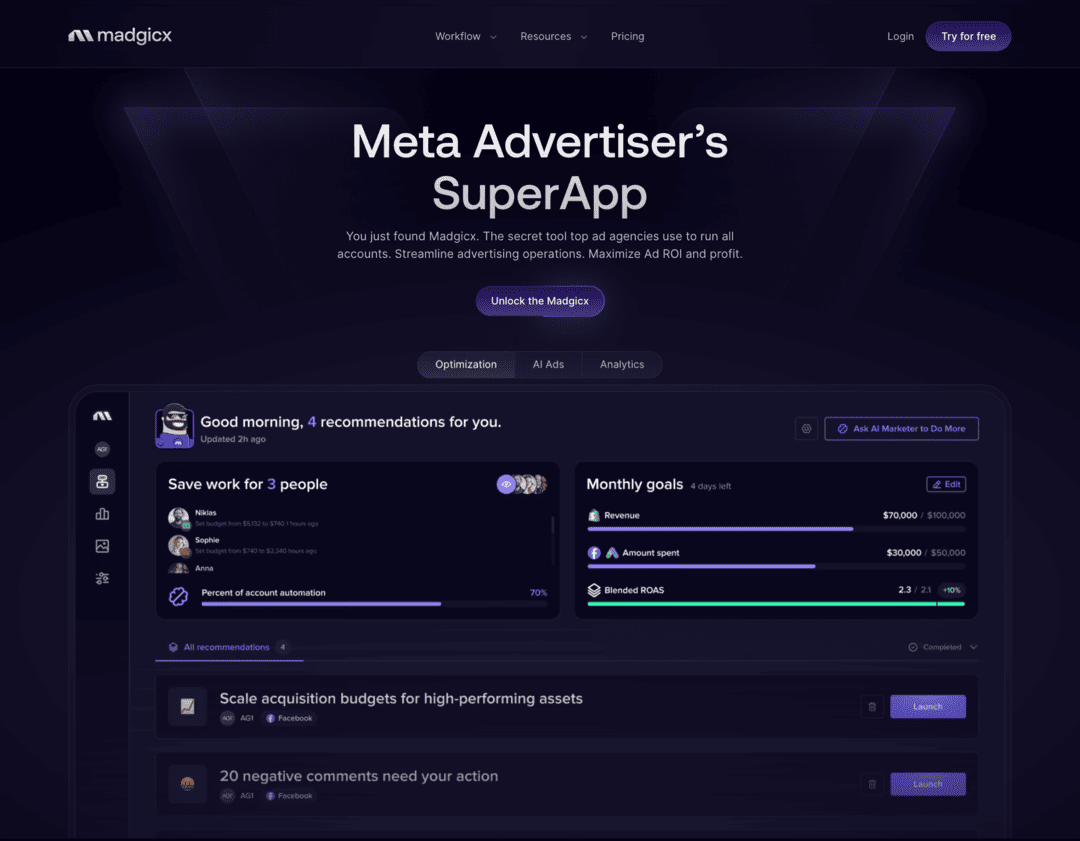
Strengths:
- Shopify integration for reporting
- AI Marketer provides 24/7 account monitoring and recommendations
- AI Ad Generator lets you batch-create high-performing Meta ads in seconds
- E-commerce-specific automation workflows
- E-commerce-focused Meta ads templates
- AI Bidding reallocates budgets across audiences within an ad set, without changing targeting. Exclusive to Madgicx
Best For: E-commerce businesses spending $1K+ monthly on Facebook/Instagram ads
Pricing: Starting at $99/month
For E-commerce Success: Madgicx stands out for online stores because it's built specifically for e-commerce scaling challenges. The combination of AI automation, creative generation, and Shopify reporting integration makes it designed around e-commerce workflows rather than general Meta advertising.
Klaviyo: AI-Powered Email Marketing Automation
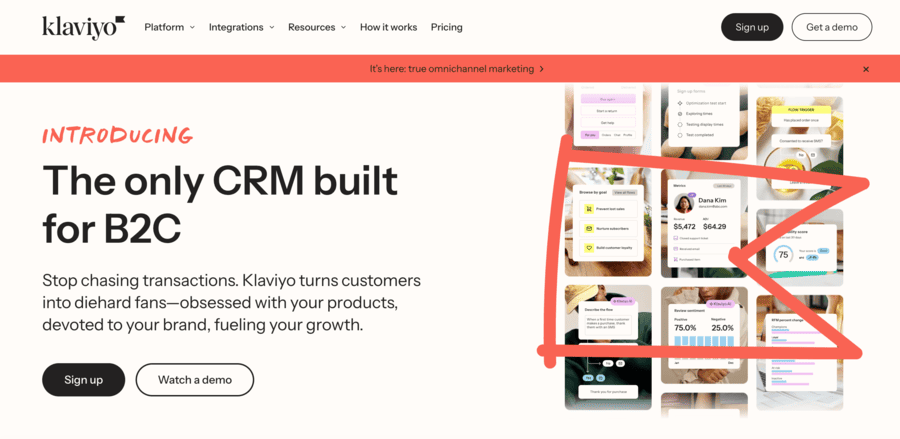
Strengths:
- Predictive analytics for customer lifetime value
- AI-driven send time optimization
- Smart segmentation based on purchase behavior
- Automated product recommendations in emails
- Cross-channel customer journey mapping
Best For: E-commerce stores wanting to automate email marketing with AI personalization
Pricing: Plans start at $45/month for 15,000 emails a month
For E-commerce Success: Klaviyo's AI learns from your customer data to predict the best products to recommend, optimal send times, and which customers are likely to churn, making email automation incredibly effective for online stores.
Jasper: AI Content Creation and Brand Voice
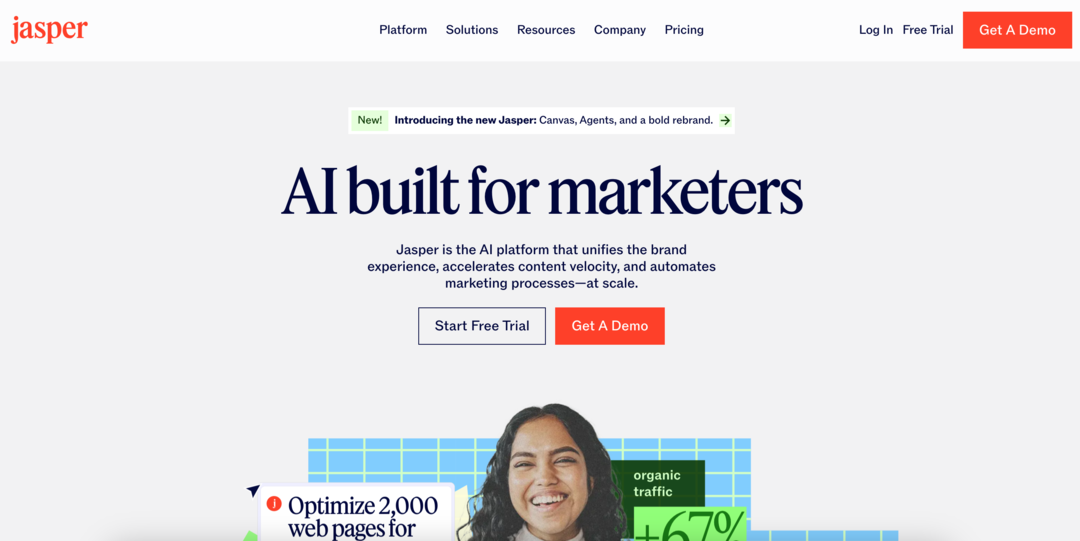
Strengths:
- Brand voice training for consistent messaging
- AI-generated product descriptions at scale
- Social media content automation
- SEO-optimized blog content creation
- Multi-language content generation
Best For: E-commerce brands needing consistent, on-brand content across multiple channels
Pricing: Starting at $39/month for Creator plan
For E-commerce Success: Jasper excels at maintaining brand consistency while scaling content production. Perfect for product descriptions, social captions, and blog content that drives organic traffic to your store.
Dynamic Yield: AI-Powered Personalization Platform
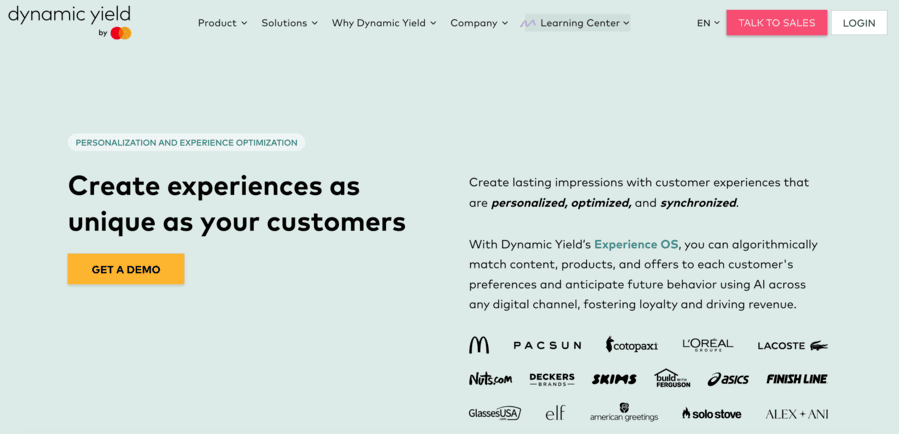
Strengths:
- Real-time website personalization
- AI-driven product recommendations
- Behavioral targeting across touchpoints
- A/B testing automation for user experiences
- Cross-device customer journey optimization
Best For: Medium to large e-commerce stores wanting comprehensive personalization
Pricing: Free trial available. The base package is from around $35,000 per year
For E-commerce Success: Dynamic Yield uses AI to personalize every aspect of the shopping experience, from homepage content to product recommendations, significantly increasing conversion rates and average order value.
Yotpo: AI-Enhanced Customer Experience Platform
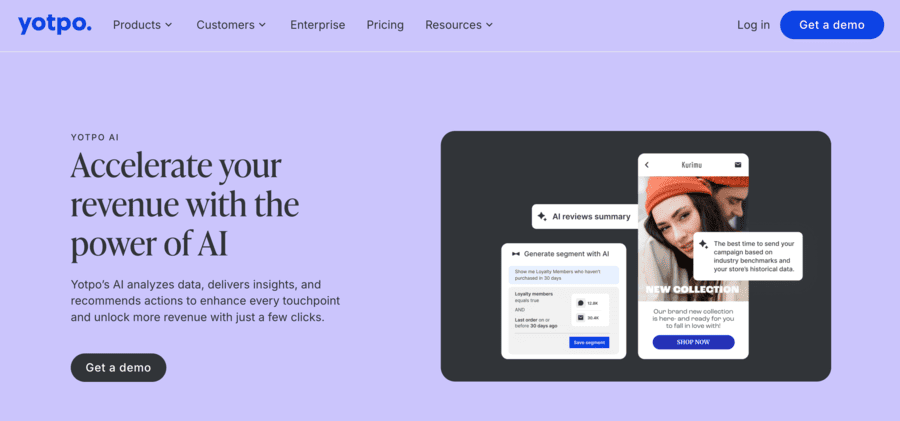
Strengths:
- AI-powered review collection and management
- Smart loyalty program automation
- Predictive customer segmentation
- Automated referral program optimization
- Social proof optimization across the customer journey
Best For: E-commerce brands focusing on customer retention and social proof
Pricing: Free plan available, paid plans start at $29/month
For E-commerce Success: Yotpo's AI analyzes customer behavior to automatically trigger review requests, loyalty rewards, and referral opportunities at the optimal moments, maximizing customer lifetime value.
Advanced E-commerce Automation Strategies
Seasonal Campaign Automation
Set up campaigns that automatically activate for:
- Black Friday/Cyber Monday: Budget increases and promotional creative
- Valentine's Day: Romantic product focus for relevant categories
- Back-to-school: Timing-based audience targeting
- Holiday seasons: Gift-focused messaging and expanded audiences
Inventory-Based Budget Allocation
Connect your inventory management system to automatically:
- Increase budgets for high-stock items
- Reduce spend on low-inventory products
- Pause campaigns for out-of-stock items
- Boost promotion for overstock clearance
Customer Lifetime Value Optimization
Use AI to optimize for long-term value:
- Higher bids for customers likely to make repeat purchases
- Retention campaigns for high-value customer segments
- Upsell automation based on purchase history
- Loyalty program integration for automated rewards
Cross-Platform Retargeting Sequences
Coordinate campaigns across platforms:
- Facebook to Google retargeting handoffs
- Email to social campaign coordination
- SMS integration for abandoned cart recovery
- Push notification timing optimization
Generative AI for marketing is revolutionizing how these advanced strategies get implemented, making complex automation accessible to businesses without technical teams.
Common Pitfalls and How to Avoid Them
Pitfall 1: Over-Automation Too Quickly
The Problem: Turning on every automation feature at once
The Solution: Implement gradually, test one automation at a time
Best Practice: Start with budget management, then add audience automation
Pitfall 2: Ignoring Brand Voice
The Problem: AI-generated content that doesn't match your brand
The Solution: Set clear brand guidelines and review AI-created content
Best Practice: Use AI for optimization, maintain human oversight for messaging
Pitfall 3: Not Setting Proper Safeguards
The Problem: AI spending too aggressively or making poor decisions
The Solution: Set conservative limits initially, expand as you gain confidence
Best Practice: Daily budget caps, ROAS minimums, and performance alerts
Pitfall 4: Insufficient Data for AI Learning
The Problem: Expecting AI to work miracles with limited data
The Solution: Ensure sufficient conversion volume before automation
Best Practice: Minimum 50 conversions per week for reliable AI optimization
Pitfall 5: Forgetting to Monitor and Adjust
The Problem: "Set it and forget it" mentality
The Solution: Regular performance reviews and strategy adjustments
Best Practice: Weekly automation performance audits
FAQ Section
How much can I save with AI marketing automation for e-commerce?
The typical e-commerce business or marketer saves 13 hours per week (50+ hours monthly) on campaign management while seeing a 30% average ROI increase. For a store spending $10,000 monthly on ads, this translates to roughly $3,000 in additional profit plus the value of your reclaimed time.
Will AI marketing automation work with my Shopify store?
Yes, modern AI automation platforms like Madgicx integrate directly with Shopify for easy-access reporting. You’ll see your store’s performance side by side with your Meta ad metrics, bringing product sales, ROAS, and attribution into one unified analytics dashboard.
Can I still control my campaigns with automation enabled?
Absolutely. AI marketing automation enhances your control rather than replacing it. You set the goals, budgets, and brand guidelines – the AI handles the repetitive optimization tasks. Most platforms offer override capabilities, so you can manually adjust campaigns whenever needed. Think of it as having an extremely capable assistant rather than giving up control entirely.
How long does it take to see results from AI marketing automation?
Initial improvements typically appear within 7-14 days as the AI learns your audience and optimization patterns. Significant results usually emerge after 30 days when the system has enough data to make confident optimization decisions. However, time savings begin immediately since you're no longer manually adjusting bids and budgets throughout the day.
What's the difference between AI and rule-based automation?
Rule-based automation follows "if this, then that" logic you pre-program (if ROAS drops below 2.0, then pause campaign). AI automation uses machine learning marketing to analyze patterns and make predictive decisions based on thousands of variables simultaneously. AI adapts and learns, while rules only execute predetermined actions. For e-commerce, AI is far superior because customer behavior is complex and constantly changing.
Start Automating Your E-commerce Ads Today
The numbers don't lie: 50+ hours of your time back each month, 30% higher ROI, and 24/7 optimization that never sleeps. While you've been manually tweaking campaigns, your smartest competitors have already implemented AI marketing automation and are scaling faster than ever.
The global marketing automation market is projected to reach $15.62 billion by 2030, which means early adopters will have a massive competitive advantage. Every day you delay automation is another day of lost efficiency and missed opportunities.
For e-commerce businesses serious about scaling, Madgicx offers a comprehensive AI automation platform built specifically for online stores that advertise on Meta. The combination of AI-powered optimization, creative generation, and deep e-commerce integrations makes it designed for businesses ready to automate their way to higher profits.
The question isn't whether you should implement AI marketing automation for e-commerce – it's whether you can afford not to. Your competitors are already saving hours monthly while you're still managing campaigns manually.
Ready to join the thousands of e-commerce owners who've automated their way to 30% higher ROI?
Stop spending nights optimizing campaigns manually. Madgicx's AI automation for Meta ads handles bidding, audience targeting, and budget allocation 24/7, so you can focus on growing your business instead of managing ads.
Digital copywriter with a passion for sculpting words that resonate in a digital age.




.jpg)


.avif)







